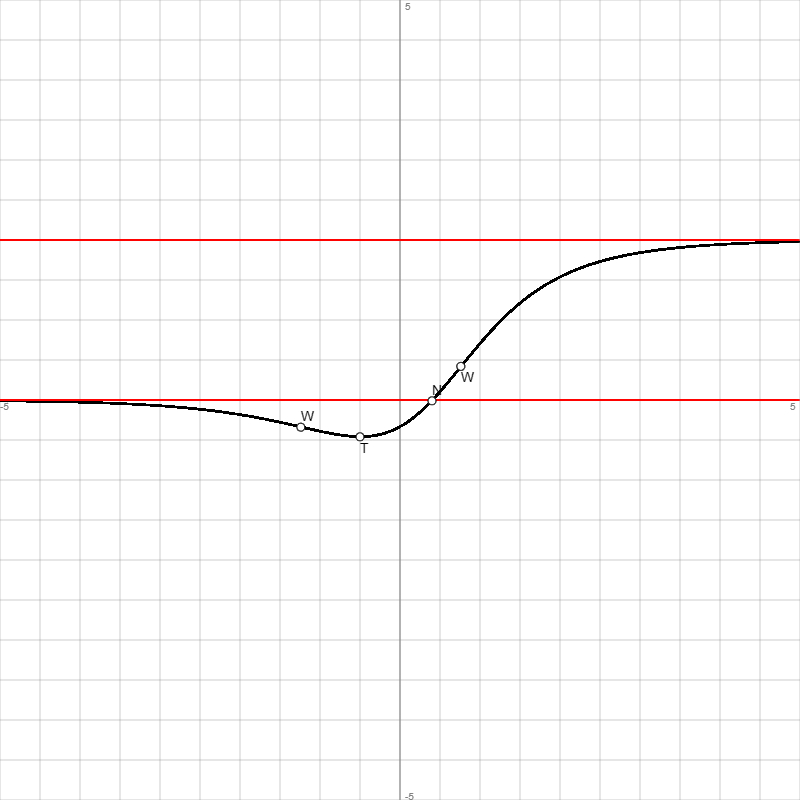 , Df = R, Wf = [-0.4577; 2), reelle Funktion, x -> -∞: f(x) -> 2 = y als Grenzkurve, x -> +∞: f(x) -> 0 = y als Grenzkurve ->
, Df = R, Wf = [-0.4577; 2), reelle Funktion, x -> -∞: f(x) -> 2 = y als Grenzkurve, x -> +∞: f(x) -> 0 = y als Grenzkurve ->www.michael-buhlmann.de
Funktion: f(x) =  , Df = R, Wf = [-0.4577; 2), reelle Funktion, x -> -∞: f(x) -> 2 = y als Grenzkurve, x -> +∞: f(x) -> 0 = y als Grenzkurve ->
, Df = R, Wf = [-0.4577; 2), reelle Funktion, x -> -∞: f(x) -> 2 = y als Grenzkurve, x -> +∞: f(x) -> 0 = y als Grenzkurve ->
| Wertetabelle: | |||||
| x | f(x) | f'(x) | f''(x) | f'''(x) | Besondere Kurvenpunkte |
| -5 | -0.0101 | -0.01 | -0.01 | -0.01 | |
| -4.5 | -0.0165 | -0.02 | -0.02 | -0.02 | |
| -4 | -0.0271 | -0.03 | -0.03 | -0.02 | |
| -3.5 | -0.0444 | -0.04 | -0.04 | -0.04 | |
| -3 | -0.0721 | -0.07 | -0.06 | -0.05 | |
| -2.5 | -0.116 | -0.11 | -0.09 | -0.06 | |
| -2 | -0.183 | -0.16 | -0.12 | -0.02 | |
| -1.5 | -0.278 | -0.22 | -0.08 | 0.2 | |
| -1.24 | -0.3363 | -0.23 | 0 | 0.45 | Wendepunkt W(-1.24|-0.34) |
| -1 | -0.3901 | -0.21 | 0.14 | 0.81 | |
| -0.5 | -0.4577 | 0 | 0.76 | 1.59 | Tiefpunkt T(-0.5|-0.46) |
| 0 | -0.3333 | 0.56 | 1.37 | 0.23 | Schnittpunkt Sy(0|-0.33) |
| 0.4 | 0 | 1.05 | 0.95 | -2.28 | Nullstelle N(0.4|0) |
| 0.5 | 0.1039 | 1.14 | 0.7 | -2.6 | |
| 0.76 | 0.4153 | 1.23 | 0 | -2.46 | Wendepunkt W(0.76|0.42) |
| 1 | 0.7054 | 1.17 | -0.47 | -1.5 | |
| 1.5 | 1.2101 | 0.83 | -0.75 | 0.19 | |
| 2 | 1.5377 | 0.5 | -0.54 | 0.5 | |
| 2.5 | 1.7304 | 0.29 | -0.32 | 0.35 | |
| 3 | 1.8415 | 0.17 | -0.18 | 0.2 | |
| 3.5 | 1.9059 | 0.1 | -0.1 | 0.11 | |
| 4 | 1.9437 | 0.06 | -0.06 | 0.06 | |
| 4.5 | 1.9662 | 0.03 | -0.04 | 0.04 | |
| 5 | 1.9796 | 0.02 | -0.02 | 0.02 | |
| Graph: | |||||
 | |||||
Graph(en) der Asymptote(n), Grenzkurve(n).
Abkürzungen: Df = (maximaler) Definitionsbereich, f(x) = Funktion, f'(x) = 1. Ableitung, f''(x) = 2. Ableitung, f'''(x) = 3. Ableitung, H = Hochpunkt, L = Lücke, N = Nullstelle, P = Polstelle, R = reelle Zahlen, S = Sprungstelle, T = Tiefpunkt, W = Wendepunkt, WS = Sattelpunkt, Wf = Wertebereich, {.} = ein-/mehrelementige Menge, [.; .] = abgeschlossenes Intervall, (.; .) = offenes Intervall, [.; .), (.; .] = halboffenes Intervall, ∞ = unendlich.
Bearbeiter: Michael Buhlmann